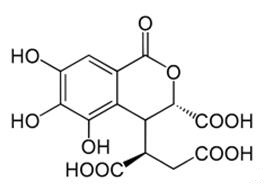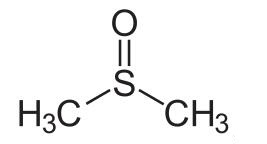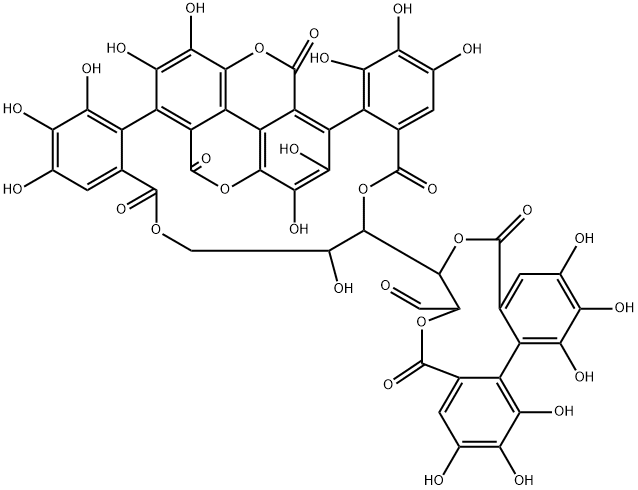Punicalagin – a type of Phenolic Compound
Dec 16,2019
Punicalagin is an ellagitannin, a type of phenolic compound. It is found in forms alpha and beta in pomegranates (Punica granatum), in Terminalia catappa and Terminalia myriocarpa, and in Combretum molle, the velvet bushwillow, a plant species found in South Africa. These three genera are all Myrtales and the last two are both Combretaceae [1].
Punicalagins are water-soluble and hydrolyze into smaller phenolic compounds, such as ellagic acid. There were no toxic effects in rats on a 6% diet of punicalagins for 37 days. In laboratory research, punicalagins had carbonic anhydrase inhibitor activity [1].
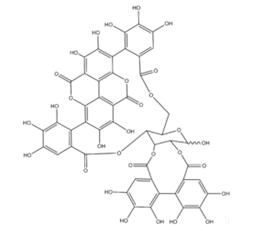
Punicalagins are large molecules (ellagitannins) found in Pomegranates and Pomegranate Juice. They themselves are very potent anti-oxidants, and they can be metabolized into other compounds (ellagic acid, urolithins) that themselves have anti-oxidant capabilities (although lesser). This large anti-oxidant value of punicalagins, about thrice that of red wine and green tea, is what brought Pomegranates to fame. That being said, the overall amount of punicalagins that get into the bloodstream after oral ingestion is quite small (6% is the highest noted and was in rats, sometimes human studies don't even notice punicalagins in the blood). The ellagic acid and urolithins still confer a lot of health benefits, but their anti-oxidant capabilities are on par with green tea and red wine if not a bit less potent. There is a very high variation between individuals, and like daidzein (one of the soy isoflavones) it may be genetically dependent on what intestinal microflora one possesses [2].
Like green tea, pomegranate is also rich in polyphenolic flavonoids. The phenol punicalagin is responsible for more than 50% of the juice's potent antioxidant activity. It appears that pomegranate juice has higher levels of punicalagin because the rind is used in its production. In fact, there is actually more antioxidant activity from the tannins in the juice than there is in the fruit itself. A 2-year, single-center clinical trial was completed for 48 men with prostate cancer and a rising PSA level after either surgery or radiotherapy for the treatment of prostate cancer. Men in this study consumed 8 oz of pomegranate juice daily. Their mean PSA doubling time (a favorable result) significantly increased with pomegranate juice supplementation, from a mean of 14–26 months [3].
Obesity is associated with an increasing prevalence of cardiovascular diseases and metabolic syndrome. It is of paramount importance to reduce obesity-associated cardiac dysfunction and impaired energy metabolism. Ke Cao etc. investigated the activation of the AMP-activated protein kinase (AMPK) pathway by punicalagin (PU), a major ellagitannin in pomegranate was investigated in the heart of a rat obesity model. In male SD rats, eight-week administration of 150 mg/kg pomegranate extract (PE) containing 40% punicalagin sufficiently prevented high-fat diet (HFD)-induced obesity associated accumulation of cardiac triglyceride and cholesterol as well as myocardial damage. Concomitantly, the AMPK pathway was activated, which may account for prevention of mitochondrial loss via upregulating mitochondrial biogenesis and amelioration of oxidative stress via enhancing phase II enzymes in the hearts of HFD rats. Together with the normalized expression of uncoupling proteins and mitochondrial dynamic regulators, PE significantly prevented HFDinduced cardiac ATP loss. Through in vitro cultures, we showed that punicalagin was the predominant component that activated AMPK by quickly decreasing the cellular ATP/ADP ratio specifically in cardiomyocytes. Our findings demonstrated that punicalagin, the major active component in PE, could modulate mitochondria and phase II enzymes through AMPK pathway to prevent HFD-induced cardiac metabolic disorders [4].
Punicalagin (PC) is an ellagitannin found in the fruit peel of Punica granatum. Maryam Zahin etc. have demonstrated antioxidant and antigenotoxic properties of Punica granatum and showed that PC and ellagic acid (EA) are its major constituents. They demonstrate the antimutagenic potential, inhibition of BP-induced DNA damage, and antiproliferative activity of PC and EA. Incubation of BP with rat liver microsomes, appropriate cofactors, and DNA in the presence of vehicle or PC and EA showed significant inhibition of the resultant DNA adducts, with essentially complete inhibition (97%) at 40 μM by PC and 77% inhibition by EA. Antimutagenicity was tested by Ames test. Almost all the doses tested (50–500 μM) exhibited significant antimutagenicity. A profound antiproliferative effect on human lung cancer cells was also shown with PC and EA. Together, their data show that PC and EA are pomegranate bioactivities responsible for inhibition of BP-induced DNA adducts and strong antimutagenic, antiproliferative activities. However, these compounds are to be evaluated in suitable animal model to assess their therapeutic efficacy against cancer [5].
References
[1] https://en.wikipedia.org/wiki/Punicalagin
[2] https://examine.com/supplements/punicalagins/
[3] David Rakel MD, in Clinical Men's Health, 2008, Chapter 22 - Integrative Medicine.
[4] Ke Cao, Jie Xu, Wenjun Pu, Zhizhong Dong, Lei Sun, Weijin Zang, Feng Gao, Yong Zhang, Zhihui Feng & Jiankang Liu, Punicalagin, an active component in pomegranate, ameliorates cardiac mitochondrial impairment in obese rats via AMPK activation, Scientific Reports volume 5, Article number: 14014 (2015).
[5] Maryam Zahin, Iqbal Ahmad, Ramesh C. Gupta and Farrukh Aqil, Punicalagin and Ellagic Acid Demonstrate Antimutagenic Activity and Inhibition of Benzo[a]pyrene Induced DNA Adducts, BioMed Research International, Volume 2014, Article ID 467465, 10 pages, https://dx.doi.org/10.1155/2014/467465
- Related articles
- Related Qustion
Chebulic acid is a phenolic compound isolated from the ripe fruits of Terminalia chebula.[3] This compound possesses an isomer, neochebulic acid.....
Dec 16,2019Plant extractsDimethyl sulfoxide (DMSO) is an organosulfur compound with the formula (CH3)2SO. This colorless liquid is an important polar aprotic solvent that dissolves both polar and nonpolar compounds.....
Dec 16,2019Organic Raw MaterialPunicalagin
65995-63-3You may like
- Kuromanin chloride: Synthesis and properties
Dec 12, 2025
- Synephrine: use,mechanism and risk assessment
Nov 3, 2025
- Pharmacology research of Genipin
Oct 15, 2025
- Punicalagin
-
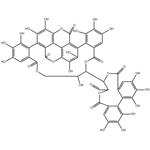
- 2025-12-19
- CAS:65995-63-3
- Min. Order:
- Purity: 0.99
- Supply Ability:
- Punicalagin
-
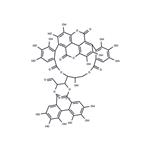
- $138.00 / 50mg
- 2025-12-19
- CAS:65995-63-3
- Min. Order:
- Purity: 99.70%
- Supply Ability: 10g
- Punicalagin; pomegranate leaf extract
-
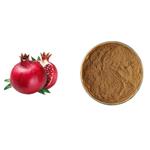
- $0.00 / 1KG
- 2025-12-19
- CAS:65995-63-3
- Min. Order: 1KG
- Purity: 10%-98% HPLC
- Supply Ability: 1000KG




